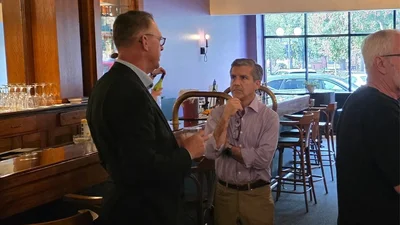Woman’s “textbook” good health turns into a horror story – and she thrives | https://www.blessinghealth.org/
Woman’s “textbook” good health turns into a horror story – and she thrives | https://www.blessinghealth.org/
Woman’s “textbook” good health turns into a horror story – and she thrives
Julie Eftink was not supposed to get this disease. She ate right, exercised regularly, felt strong and had no family history of the illness. Her genetic tests showed no abnormalities that lead to the condition, and the statistics said she was a bit too young for it.
This disease does not care.
At the age of 43, Julie – the mother of two active teenagers, wife of 19 years to Chad, and 20- year Blessing Health licensed clinical social worker – was diagnosed with rectal cancer. Most colorectal cancer patients are over the age of 50. But since the mid-1990s, cases among people younger than 50 years old have been on the rise, and medical experts expect that trend will continue and grow for a variety of reasons.
Julie’s story
Julie is busy. In addition to her active family and full-time job as a mental health therapist, she is a small business owner with a home decor shop, Lavender Jewel Interiors. “I love to create,” Julie said.
In May 2021, she started feeling funny, experiencing abdominal discomfort and bloating. The feelings would come and go.
“I thought it was acid reflux,” Julie said. “I even had my gallbladder checked out.”
No problems were found.
Then some changes in bowel movements began, and the frequency of symptoms increased. Julie saw her Blessing Health primary care provider, Abby Reich, M.D., who referred her to Blessing’s gastroenterology department and Dr. Daniel Moore and nurse practitioner Mandy McAllister. A colonoscopy was ordered. Julie, a positive person by nature, remained optimistic.
“Going into it I am thinking I’ve got Crohn’s disease, or there is something off with my diet. It never crossed my mind that I was going to be told that I had cancer,” Julie said.
The diagnosis: Stage 3 rectal cancer.
“Just disbelief,” Julie said of hearing those words. “Thinking the worst thoughts that can enter your mind, am I going to be here as my children grow older? Feelings you never want to experience.”
Julie chooses her treatment
Julie called on another of her personal characteristics – strength – and researched treatment options. In consultation with Blessing Health colorectal cancer surgeon Harsha Polavarapu, M.D., she decided on total neoadjuvant treatment (TNT). That meant instead of undergoing chemotherapy and radiation, then surgery, followed by more chemotherapy, as is common in rectal cancer care, Julie received short-course radiation followed by all chemotherapy upfront. Her hope was to avoid surgery and the need for a temporary ileostomy. That is a bowel diversion procedure that requires a pouch be attached to the abdomen to collect waste.
So, in cooperation with an TNT provider at Barnes Jewish Hospital, Julie became a patient of the nationally accredited Blessing Cancer Center. Over a five-month period, her care included five days of intense radiation therapy under the direction of Dr. Robert Johnson and eight rounds of chemotherapy under the direction of medical oncologist Dr. Kellie Flippin.
“There has been great communication between Barnes and Blessing,” Julie said. Blessing is an original member of the multi-hospital BJC (Barnes Jewish Christian) Collaborative, which works to improve health care quality and efficiency.
Julie had her first post-treatment scan in June of 2022, four weeks after her last treatment. It showed no evidence of cancer. She now undergoes extensive testing every three months to ensure the cancer remains in remission.
“I am cancer-free, but also prepared to have surgery if something shows up,” she said.
In addition to the care of her doctors and the strong support found in her faith, family and the community, Julie said Diana Seals, Blessing’s colorectal cancer patient navigator, made her treatment experience, “understandable and comforting.” As a patient navigator, Diana is available to attend appointments with patients to take notes about what the doctor says and to discuss them later with patients, to find answers to patients’ questions and provide support throughout treatment.
Lessons learned
“Just because you think you are healthy, don’t dismiss those symptoms,” Julie warned. “If your body is telling you something is wrong, listen to it. Get it checked out.”
To learn more about Blessing Health’s colorectal cancer care, go to blessinghealth.org/colon.
When she was first diagnosed, Julie came across this quote from Pastor Joel Osteen that helped shape her cancer journey: “Make up your mind that no matter what comes your way, no matter how difficult, no matter how unfair, you will do more than simply survive. You will thrive in spite of it.”
For more information on Blessing’s colorectal cancer care, go to blessinghealth.org/colon.
The signs and symptoms of colorectal cancer are sneaky
From the Centers for Disease Control and Prevention
Colorectal polyps (abnormal growths in the colon or rectum that can turn into cancer if not removed) and colorectal cancer don’t always cause symptoms, especially at first.
Someone could have polyps or colorectal cancer and not know it. That is why getting screened regularly for colorectal cancer is so important. A person should talk with their health care provider about a screening schedule that is right for them.
If you have symptoms, they may include:
- a change in bowel habits.
- blood in or on your stool (bowel movement).
- diarrhea, constipation, or feeling that the bowel does not empty all the way.
- abdominal pain, aches, or cramps that don’t go away.
- weight loss and you don’t know why.
Original source can be found here



 Alerts Sign-up
Alerts Sign-up